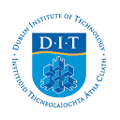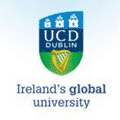Universities in Ireland

Dublin City University

Dublin Institute of Technology

Export Edge Business College
Griffith College Dublin
Hamilton Institute

Infinity Business College

UCD Drama Studies Centre

UCD Michael Smurfit Graduate Business School
Warnborough College (Ireland)
Universities in Ireland by City:
BlackrockCarlowCorkDublinKildareLimerickAbout universities in Ireland
Higher education in Ireland is overseen by the Irish Ministry of Education and Skills and is mostly free of cost for all Irish citizens and for those studying abroad from countries belonging to the European Union. There are nearly 40 public institutions of higher learning in the country, and while tuition is not charged, students do have to pay fees for things such as books, examinations and certain student services. English, the official language of Ireland, is the language of instruction in all but a few of these institutions, with Irish serving as the instruction language in most of the other schools.
The higher education system in Ireland is made up of universities and colleges, offering undergraduate, graduate and postgraduate education in a variety of academic and professional disciplines. Currently there are seven universities in Ireland and approximately 35 colleges and technical institutions. In recent years, the structure of education at these institutions has been transformed in accordance with the Bologna Process, an educational reform measure aimed at standardizing the credit and degree structure in all universities throughout the European Union. Under this system, each academic year for full-time students now equates to 60 credits or ECTS.
Also part of the Bologna Process reform was a restructuring of the degree system. As a result of these changes, Ireland now has three degree levels: the (academic) Bachelor degree, spanning three years (180 credits) in duration; the Master’s Degree, which normally takes an additional two years (120 credits) to complete; and the Doctorate or PhD degree, which can span anywhere from 3-5 years. At the undergraduate level, students may also pursue a Professional Bachelor degree, a four-year program (240 credits) usually in a vocational or professional discipline, rather than in a specific academic area of study.
Many of the colleges in Ireland are linked directly to the country’s major universities, such as the University of Limerick and Dublin City University, both of which have satellite campuses or colleges that fall directly under the purview of those universities. Other colleges are overseen by the Higher Education and Training Awards Council (HETAC). Most of these schools offer education in only a select number of fields, such as teaching, technology, or other professional or vocational disciplines. Schools overseen by HETAC have the authority to grant degrees, diplomas and certificates under the name of each specific college, while the schools overseen by the country’s universities usually grant awards under the university name.
Because entry into Ireland’s seven universities is mostly free of cost, the admission process is fairly rigid and cpmpetitive. Unlike the admittance process in other countries, students in Ireland do not apply to a specific university. Instead, enrollment requests are sent to Ireland’s Central Application Office, which grants admission into the universities according to scores earned on the secondary Leaving Certificate Examination. Students applying from other EU countries are similarly granted admission according to the exit examinations from their home countries. Students who are granted tentative admittance must also show proficiency in English (or Irish for schools in which the language of instruction is Irish) and mathematics prior to being granted full entry. Certain institutions also require fluency in at least one other European language (Spanish, French, etc.) as an admission requirement.
Once a student is admitted to one of Ireland’s universities and chooses a subject or area of study in which to focus their education, they may also be required to take and pass an entrance examination for that particular degree program. A student wishing to major in mathematics, for example, would usually have to take an exam to show proficiency in mathematics-related areas, such as advanced algebra, trigonometry, and/or secondary school-level calculus.
In five of Ireland’s universities, students are permitted to choose their major after their first year of study—an advantage known as “omnibus entry” for students who are still trying to decide where they will ultimately focus their studies. At the remaining two universities, students must name a certain category in which they plan to major, such as the sciences, social sciences or arts and humanities. Then, in their junior or senior year they must narrow down their choice to a specific area of study, such as biology, sociology, or fine arts.
Most of the colleges in Ireland, where admission is not as competitive, allow open enrollment, in which students are free to pursue their general education requirements before choosing a major area of study in their junior year.

